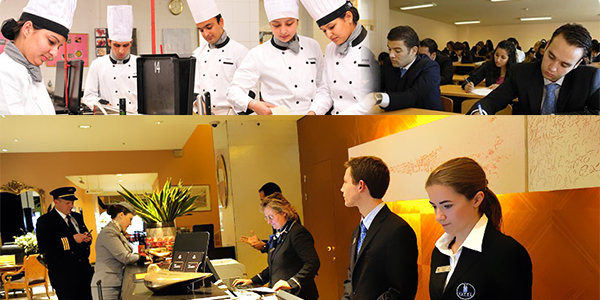From Classroom to Career: Navigating a Hospitality Management Diploma Course

Embarking on a journey from the classroom to a thriving career in the hospitality industry is an exciting and rewarding prospect, especially for those pursuing a Hospitality Management Diploma Course. This specialized program not only equips students with theoretical knowledge but also provides practical skills essential for success in the dynamic world of hospitality. In this comprehensive exploration, we will delve into the transformative journey that a hospitality management course offers, emphasizing its role in shaping well-rounded professionals ready to tackle the challenges and seize the opportunities in the ever-evolving hospitality sector.
The Foundation of Knowledge:
A Hospitality Management Diploma Course serves as the bedrock for a comprehensive understanding of the industry. It immerses students in a diverse array of subjects, including hospitality principles, customer service, event management, business communication, and financial management. This well-rounded curriculum ensures that graduates are not only adept at managing day-to-day operations but also possess a strategic and holistic perspective on the industry.
Practical Learning Experience:
One of the distinctive features of a Hospitality Management Diploma Course is its emphasis on hands-on experience. Students often engage in real-world scenarios through internships, workshops, and simulations. This practical approach not only reinforces theoretical concepts but also hones the problem-solving and decision-making skills crucial in the hospitality sector. From managing hotel operations to planning and executing events, students gain invaluable experience that prepares them for the dynamic nature of the industry.
Industry-Relevant Specializations:
The hospitality industry encompasses various sectors, each with its unique challenges and opportunities. A Hospitality Management Diploma Course allows students to choose specializations based on their interests and career goals. Whether it’s hotel management, restaurant management, event planning, or tourism, this tailored approach ensures that graduates are well-prepared for their chosen niche within the industry. The specialization aspect adds a layer of customization, making the diploma course adaptable to the diverse career aspirations of its participants.
Networking Opportunities:
Throughout the duration of a Hospitality Management Diploma Course, students have ample opportunities to interact with industry professionals. Seminars, guest lectures, and participation in networking events facilitate the establishment of connections with professionals already thriving in the field. These connections can lead to mentorship, internships, and even job opportunities post-graduation. Building a robust professional network is an essential aspect of transitioning from the classroom to a successful career in hospitality.
Soft Skills Development:
In addition to technical knowledge, a Hospitality Management Course places significant emphasis on soft skills development. Effective communication, teamwork, adaptability, and problem-solving are cultivated, recognizing their paramount importance in the service-oriented nature of the hospitality industry. Graduates emerge not only as experts in their field but also as well-rounded professionals capable of navigating the intricacies of human interactions, an essential aspect of the hospitality experience.
Global Perspective:
The hospitality industry is inherently global, with opportunities spanning across continents. A well-structured Hospitality Management Diploma Course often includes elements that provide students with a global perspective. This might involve studying international hospitality trends, understanding diverse cultural nuances, and even having the chance to participate in exchange programs. Exposure to global perspectives prepares graduates to navigate the diverse and multicultural landscape of the hospitality industry, adding a valuable layer to their skill set.
Adapting to Industry Trends:
The hospitality sector is dynamic and continuously evolving. A reputable Hospitality Management course is designed to keep pace with industry trends. From incorporating the latest technology in hotel management to understanding the growing importance of sustainable practices, students are equipped to adapt to the ever-changing landscape of the hospitality industry. The curriculum is designed to be forward-looking, ensuring that graduates are not only well-versed in current industry trends but also prepared to embrace future innovations.
Career Opportunities:
Upon successful completion of a Hospitality Management Diploma graduates find themselves well-prepared for a plethora of career opportunities. Whether it’s managing a luxury hotel, coordinating events, overseeing restaurant operations, or delving into the dynamic world of hospitality entrepreneurship, the diverse skill set acquired during the course opens doors to a range of exciting roles within the industry. The diploma course is not merely a gateway to employment but a springboard to a fulfilling and dynamic career in the hospitality sector.
Challenges and Rewards:
Transitioning from the classroom to a career in hospitality may come with its challenges. The demanding nature of the industry requires resilience, adaptability, and dedication. However, the rewards are equally significant. The sense of accomplishment in providing exceptional service, the opportunity to meet people from various walks of life, and the chance to create memorable experiences for others make the journey worthwhile. A Hospitality Management Diploma Course equips graduates to face these challenges head-on, providing them with the skills and mindset needed to turn obstacles into opportunities.
One institution that stands out for offering an exemplary Hospitality Management Diploma Course is Alice Springs College in Australia. Renowned for its commitment to providing quality education in the heart of the Australian Outback, Alice Springs College combines academic rigour with a focus on practical applications. The college’s hospitality program is tailored to meet industry demands, incorporating the unique cultural and geographical aspects of the region. Students at Alice Springs College benefit not only from a comprehensive curriculum but also from the opportunity to engage in hands-on experiences that reflect the diverse hospitality landscape of Australia. The college’s commitment to fostering a global perspective is evident in its approach, with exchange programs and industry partnerships that enhance the learning experience.
Conclusion:
In conclusion, navigating a Hospitality Management Diploma Course is not just about acquiring knowledge; it’s a transformative journey that prepares individuals for a dynamic and rewarding career in the hospitality industry. The blend of theoretical understanding, practical experience, soft skills development, and industry relevance ensures that graduates are not merely employees but ambassadors of hospitality excellence. As the industry continues to evolve, those armed with a solid foundation from their diploma course find themselves well-equipped to thrive in the ever-expanding world of hospitality. The journey from the classroom to a fulfilling career in hospitality is not just a transition; it’s a continuous adventure, and the Hospitality Management Diploma Course serves as the compass guiding graduates through this exciting expedition.



